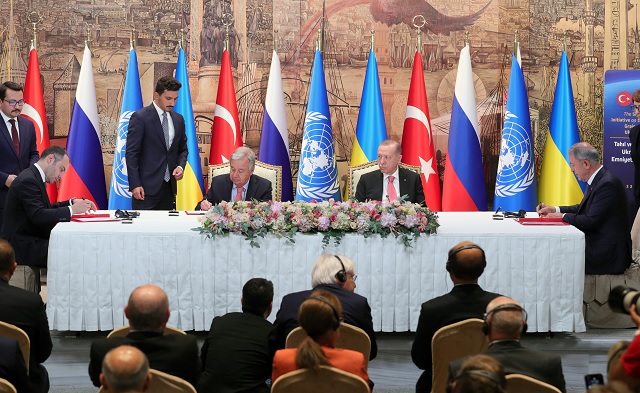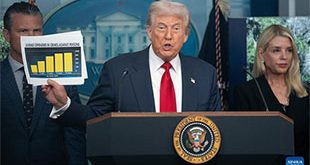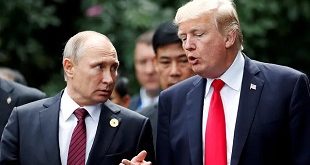
Russia and Ukraine separately signed a deal in Istanbul Friday with Türkiye and the United Nations to resume grain shipments from Ukrainian ports to international markets via the Black Sea
Moscow, Russia | Xinhua | Russia and Ukraine separately signed a deal in Istanbul on Friday with Türkiye and the United Nations to resume grain shipments from Ukrainian ports to international markets via the Black Sea.
The long-awaited deal, the first major pact between Moscow and Kiev since Russia’s special military operation in February, was welcome news for the international community as a food crisis has already been plaguing countries heavily dependent on grain imports from Ukraine and Russia.
However, the implementation of the deal could be a very bumpy ride amid Western sanctions and lack of mutual trust between Moscow and Kiev, among other challenges.
LINGERING WESTERN SANCTIONS
Following the signing of the deal, Russian Foreign Minister Sergei Lavrov called for efforts to effectively implement the agreements on transporting Ukrainian grain from the Black Sea ports and on promoting Russian exports of food and fertilizers.
“The UN assistance that is provided in good faith and the constructive approach of the international community, including the Western countries, will be instrumental in this (implementing the agreements),” he said.
Lavrov’s remarks came as U.S.-led Western countries delivered batches of lethal weapons to Ukraine and imposed bunches of sanctions on Russia, risking perpetuating the regional conflict and leaving the world to foot the bill.
According to the UN Food and Agriculture Organization, Russia and Ukraine are the world’s largest and fifth-largest wheat exporters, respectively. Together, they provide 19 percent of the world’s barley supply, 14 percent of wheat and 4 percent of maize, making up more than one third of global cereal exports. Russia is also the lead producer of fertilizers, accounting for 13 percent of the world’s production.
As Russian and Ukrainian grain exports are hindered by port disruptions and Western sanctions, food prices have reached an all-time high. Besides, restrictions on Russian fertilizer exports due to U.S. sanctions have led to a surge in global fertilizer prices.
“The U.S. and EU sanctions, both direct and indirect, actually interfere and prevent the supply of our agricultural products, and there are a lot of them. This year we are talking about 37 million tons of grain and next year about 50 million tons,” Russian Deputy Foreign Minister Sergei Vershinin said earlier this month.
Turkish geopolitical expert Baris Doster told Xinhua that Western restrictions on Russian grain exports are having a negative impact on the whole world, including those Western countries themselves.
The sanctions against Russia are worsening the global food crisis, considering that Russia is a major exporter of grain, said Sevim Dagdelen, a member of Germany’s lower house of Parliament.
Despite the grain export deal, Western countries did not guarantee that they would not interfere in the export of Russian grain and fertilizers, Rebeca Grynspan, secretary-general of the UN Conference on Trade and Development, was quoted by RIA Novosti news agency as saying.
ICE SHEETS OF MISTRUST
The UN said in a statement on its website that the grain export deal would allow significant volumes of commercial food and fertilizer exports from three key ports in the Black Sea — Odessa, Chernomorsk and Yuzhny. A Joint Coordination Center will be established in Istanbul to monitor implementation, including representatives from Türkiye, Russia and Ukraine.
According to a copy of the agreement released by Andrii Sybiha, deputy head of the Ukrainian President’s Office, the deal will be effective for 120 days and can be renewed for the same duration unless one of the signing parties terminates.
However, lack of mutual trust between Russia and Ukraine has put question mark over a speedy and full implementation of the deal. The scorching hot battlefield has made it difficult to cross the ice sheets of mistrust. Apart from that, Moscow has repeatedly asked Kiev to clear mines along its coastline to facilitate shipping, but the latter is concerned about Russian military threats coming from the sea.
“Ukraine does not sign any documents with Russia. We sign an agreement with Türkiye and the UN and undertake obligations to them. Russia signs a mirror agreement with Türkiye and the UN,” Mykhailo Podoliak, adviser to the Head of the Office of President of Ukraine, tweeted Friday.
“No transport escort by Russian ships and no presence of Russian representatives in our ports. In case of provocations, an immediate military response,” he added.
The just-reached deal does not include de-mining of Ukrainian ports, and grain ships have to be guided in and out through mined port waters, a recent TASS report quoting a UN source as saying.
Alexei Podberezkin, director of the Center for Military and Political Studies at the Moscow State Institute of International Relations, said shipping in such waters is fraught with risks and there could be chaos and even provocations.
“We don’t know the mining maps of Ukrainian ports … the situation is very dangerous. So we take responsibility only for those areas where we can control the situation,” he said.
 The Independent Uganda: You get the Truth we Pay the Price
The Independent Uganda: You get the Truth we Pay the Price




Better a neighbor near than a ‘friend’ afar.